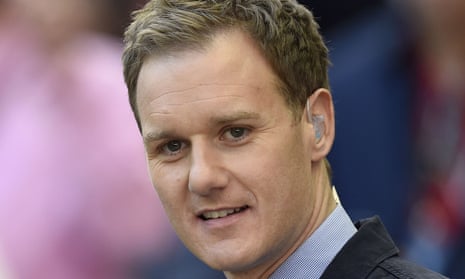Given the natural tendency of BBC current affairs programmes to evolve into versions of Radio 5 Live, it is easy to see why BBC management believed there could be no better replacement for Bill Turnbull, the departing BBC Breakfast presenter, than a young sports commentator.
The appointment of Dan Walker, a football authority with little recorded experience in current affairs (a daily show ‘Afternoon Edition’ on Radio 5 live for a year), is perfectly judged to inject into the banter-free segments of BBC Breakfast an upbeat tone that could ultimately make stories about peace initiatives in Syria seem almost as gripping as the latest tennis news.
In picking Walker, it emerges, BBC management was also fulfilling God’s plan for Dan Walker. “I firmly believe that God has a plan for me to progress in the industry,” he once said, quoting 1 Samuel 2:30: “Those who honour me I will honour.” Yea, even unto an red pulpit on a flagship BBC news programme. (NB, Breakfast losers: “Those who despise me shall be lightly esteemed.”)
Walker also likes to quote Eric Liddell, a fellow sporting evangelist, who said: “We are all missionaries. Wherever we go, we either bring people nearer to Christ, or we repel them from Christ.” If baptisms do follow Walker’s Breakfast appointment, his employers may need to think quickly, for balance’s sake, about peopling adjacent sofas with equally esteemed representatives of competing divinities.
Meanwhile, rival programmes could look threadbare without an in-house charismatic on the alert for conversion opportunities. “What a witness it would be,” Walker once said, “if the next tennis superstar was a devout Christian who got to the Wimbledon final and refused to play!” As it is: “I’ve talked to David Beckham about going to church and Noel Gallagher has asked me why I don’t swear.” It’s a start. As football fans are aware, Walker is the kind of media disciple who, if he lacks the official authority of, say, a Rev Richard Coles, our own Rev Giles Fraser, or their colleague, HSBC’s Rev Stephen Green, more than compensates for this lay status with assertions of inflexible faith.
In addition to popular footballing works, such as Dan Walker’s Football Thronkersaurus: Football’s Finest Tales, he has written a book called Sport & Sundays, about his reasons for observing “God’s moral law”, as Liddell did.
In an online Q & A supplied by his brother, Jeremy, a full-time pastor, Walker explained why there was no chance, ever, of compromise. Junior doctors might want to pay attention. “I believe that the principle of setting aside one day in the week to worship and honour the God who made me and saved me goes right back to creation,” he says. “It was a gift to all of us before sin even entered the world.” Genesis 2.3: “And God blessed the seventh day, and sanctified it: because that in it he had rested from all his work which God created and made.”
The abiding word of the living God is fine with Walker’s BBC colleagues working on Sundays and with his pre-recorded work going out for the entertainment of the religious, but less rigid. “So long as I do not directly make someone else work,” he says, “my conscience is clear.”
Following Walker’s latest promotion, however, the divine plan may have met a hitch. Nothing serious, for a person with God on his side, but a spokeswoman has already confirmed to The Times that Walker is a creationist, who appears to believe the Earth is less than 10,000 years old. Of course, this could be BBC’s point. Had Walker been in the Breakfast studio this week, covering the discovery of gravitational waves, Walker’s refusal to believe in a 13.8 billion-year-old universe or his attempts to convert a physicist, could, after decades of Attenborough, have livened up BBC science coverage as never before.
In a news week which also featured stories about Sunday trading, Muslim women and new research positing the invention of an all-seeing God as vital to the development of stable societies, the entertainment would have been non stop. And even when the news does not conflict quite so egregiously with the final word of Walker’s God, it’s likely that any Breakfast guests who fall into various spiritually denigrated categories will be rewardingly aware that their interviewer thinks they are, with all due respect, going to hell.
It was a hell-fire preacher, actually, who set him on the right road. “Christians,” he has said, “do not need to go with the flow. We are meant to be counter cultural. We do not attract sinners by being just like them in every way, but by showing the difference that God makes in our lives.”
For theologians of a more Terry Eagletonian persuasion it is possible, of course, to rise above these crude distinctions between believers and sinners, faith and science. Defenders of the amiable Walker, against hostile media coverage, have protested, as Eagleton did in a celebrated review of Dawkins, against the caricaturing of mysterious spiritual feelings which, it is maintained, in no way conflict with a fact-bound, BBC day job. After all, some BBC presenters are practising conservatives and atheists.
But if Walker has been honest enough to declare, unlike them, that his faith is insistently relevant, that his duty to witness actively demands its advertisement, it’s respectful to listen. Just as we must accept that his under-standing of the scriptures as God’s commands – including, presumably, the instructions to women to obey their husbands – read like some Dawkins-authored proof of religious backwardness and fancy.
“Dawkins tends to see religion and fundamentalist religion as one and the same,” Terry Eagleton complained – an admission that not all Christian varieties are equally meritorious. (Walker may well feel the same way about Catholicism: “box-ticking”, he’s called it). So, when proselytising biblical literalism becomes the public face of an equal opportunities BBC newsroom featuring computers, extra-marital sex and stories about dinosaurs, what next?
Last week, a creationist primary school head teacher was roasted on social media, after tweeting that evolution was just “a theory”: “There’s more evidence that the Bible is true.”
The reportedly like-minded Walker seems, in comparison, to have escaped, almost miraculously, with the revelation that he, too, is unimpressed by fossils.
In the past, when Walker spoke about faith, Walker’s brother has asked for prayers: “Christians will be aware that Satan will try to bring him down, by force or fraud, a man who has taken a public stand like this.”
At risk of doing Satan’s work, Walker’s promotion is surely as dismal a result for fundamentalist Christians as it is for secularists. Suppose his BBC career does, indeed, double as an evangelical opportunity, the BBC can scarcely object when similar privileges are demanded by followers of – to name just a few of the usual suspects – the pope, Ron Hubbard, and the prophet, hoping to deconvert Walker’s converts. If this is, as advertised, God’s plan, it needs work.

